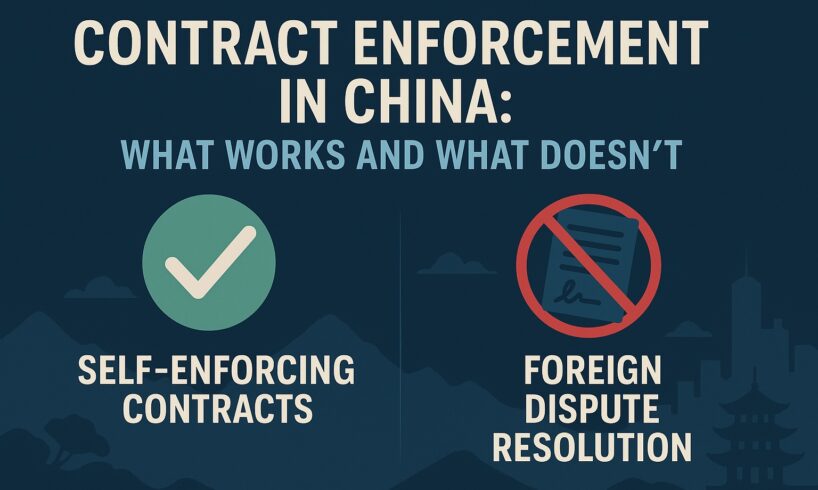
Our clients will sometimes tell us that they view contract enforcement in China as impossible. They’re partly right. Enforcing contracts in China is complicated, unpredictable, and very different than in the West. But that doesn’t mean that contracts with Chinese companies are useless. It just means you need to think differently about how to draft them, what protections really work, and what’s a waste of time.
The Problem with Contract Enforcement in China
Chinese courts do enforce contracts, but the real issue is how they do it and how they perceive the balance of power between the parties. This challenge is especially pronounced when dealing with Chinese state-owned enterprises (SOEs) or navigating joint venture agreements in China.
Many foreign companies assume that winning a foreign arbitration will guarantee protection, but Chinese courts are often reluctant to enforce foreign judgments or awards, particularly when the counterparty has political connections. Cases can drag on for years, and even a successful ruling may not result in actual recovery of damages.
For this reason, Chinese contract disputes are rarely about what the contract says in theory. They are almost always about leverage and practical enforcement.
What Works: Self-Enforcing Contract Strategies
These are the strategies we use for China contract disputes and implementation. The goal is to design a contract where performance takes place naturally because of how the deal is structured, not because you are forced to pursue litigation. This type of arrangement is called a self-enforcing contract, meaning the incentives and protections built into the deal itself make compliance the easiest or only logical choice.
Get Paid Upfront (or in Stages). The best contract is one that minimizes your risk of non-payment. For example, if a supplier only receives the next 30 percent payment after passing a quality inspection, they have every incentive to deliver on time and at the agreed standard.
Use Liquidated Damages. Chinese courts are more likely to enforce specific monetary damages written into the contract than vague promises about performance. For example, a clause requiring the factory to pay $50,000 for every two weeks of delivery delay creates a clear, enforceable cost for non-performance.
Leverage Local Jurisdiction. Contracts governed by Chinese law, written in Chinese, and enforceable in Chinese courts are taken more seriously. For example, when a WFOE contract in China specifies jurisdiction in the local court where the supplier is based, the counterparty knows enforcement (and the embarrassment that comes with a lawsuit) is a real possibility.
Secure IP with Trademarks. If you don’t register your trademark in China, you don’t own it in China, no matter what your contract says. For example, registering your brand name as a China trademark before entering into supplier contracts prevents the supplier from registering it themselves and selling under your name. This is often more effective than an NNN Agreement in preventing your partner and others from selling your product under your brand. See China Trademarks: More, More, More.
Plan for Asset Preservation. In some cases, you can seek an asset preservation order from a Chinese court at the start of litigation. For example, if a supplier is known to move assets between affiliates, freezing their bank account early gives you leverage to settle the dispute on your terms.
The German Investor Case Study
Not long ago, a German lawyer sent me a copy of a client’s failed joint venture agreement with a Chinese state-connected partner. The deal involved a €2.8 million investment in medical device production. Within 18 months, the Chinese partner had:
Diverted production to their own customers
Blocked the German company’s access to financial records
Refused to distribute profits
Threatened to terminate the German staff’s visas when confronted
The contract was in English, specified German law, and required London arbitration—making it essentially worthless for quick relief. See China Contracts That Work and A Guide to Dispute Resolution Clauses in International Contracts.
Frequently Asked Questions About China Contract Enforcement
Q: Can foreign arbitration clauses protect me in China business deals?
A: Not reliably. Even if you win in a New York or London arbitration, you likely will need Chinese courts to enforce the award against the Chinese company, and they’re reluctant when local companies have political connections.
Q: What makes a contract enforceable in Chinese courts?
A: Ideally, the contract should be in Chinese, follow China’s Contract Law requirements, include specific performance terms, and have proper dispute resolution clauses calling for the contract to be enforced in a Chinese court under Chinese law.
Q: What is an asset preservation order and when should I use one?
A: It’s a legal tool that freezes a Chinese company’s assets at the start of litigation. You should seek one when there’s a risk of the counterparty moving assets to avoid collection.
Q: What are the biggest red flags to watch for when vetting a Chinese partner?
A: Majority state ownership, being the largest employer in a small city, ties to the military or police, or ownership linked to senior officials’ families. These things will lower your ability to enforce your contract. Contracting with a Chinese company that has little to no money is another red flag. Do your due diligence before contracting.
Q: What happens if my Chinese partner declares bankruptcy during our contract?
A: Chinese bankruptcy law heavily favors secured creditors and employees. Without asset security provisions, you’ll likely recover very little.
Q: How do currency controls affect contract enforcement in China?
A: China’s foreign exchange controls can delay or block payments over $50,000. Contracts should specify which party handles SAFE approval and include backup payment mechanisms.
Conclusion
Contracts in China are not worthless, but they work differently than in the West. Success comes from using self-enforcing agreements that don’t rely on Chinese courts as the first or only line of defense. That means upfront payments, liquidated damages, proper IP protection, and careful partner due diligence.
If you’re entering into Chinese supplier contracts or planning a China business law compliance strategy, don’t fall into the trap of thinking a Western-style contract will protect you. Have your China contracts drafted to work in China, not just on paper.





